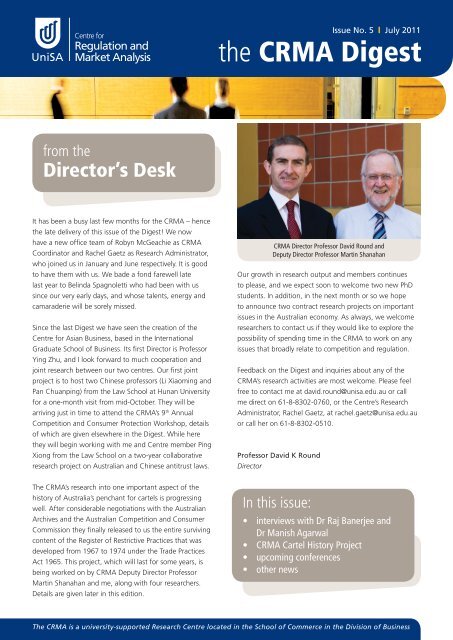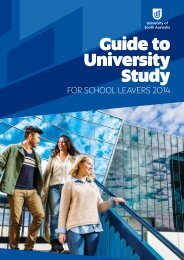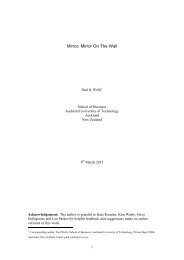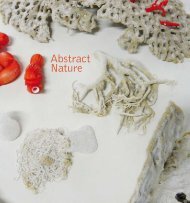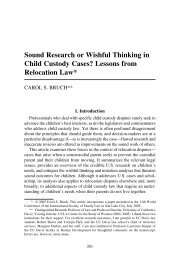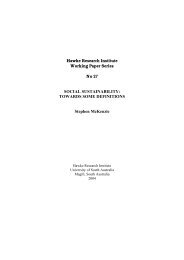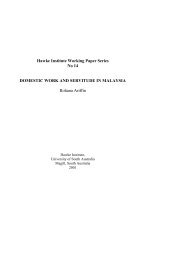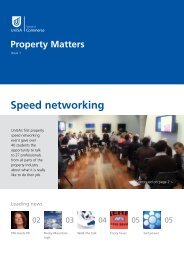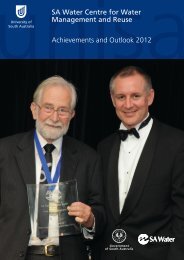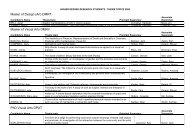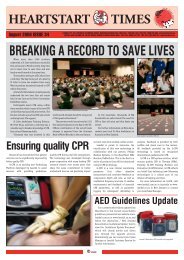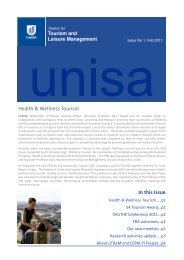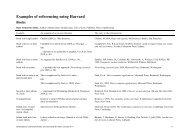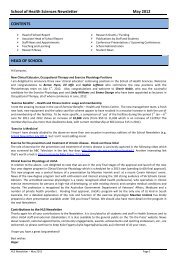Digest #5 - University of South Australia
Digest #5 - University of South Australia
Digest #5 - University of South Australia
You also want an ePaper? Increase the reach of your titles
YUMPU automatically turns print PDFs into web optimized ePapers that Google loves.
from the<br />
Director’s Desk<br />
It has been a busy last few months for the CRMA – hence<br />
the late delivery <strong>of</strong> this issue <strong>of</strong> the <strong>Digest</strong>! We now<br />
have a new <strong>of</strong>fice team <strong>of</strong> Robyn McGeachie as CRMA<br />
Coordinator and Rachel Gaetz as Research Administrator,<br />
who joined us in January and June respectively. It is good<br />
to have them with us. We bade a fond farewell late<br />
last year to Belinda Spagnoletti who had been with us<br />
since our very early days, and whose talents, energy and<br />
camaraderie will be sorely missed.<br />
Since the last <strong>Digest</strong> we have seen the creation <strong>of</strong> the<br />
Centre for Asian Business, based in the International<br />
Graduate School <strong>of</strong> Business. Its first Director is Pr<strong>of</strong>essor<br />
Ying Zhu, and I look forward to much cooperation and<br />
joint research between our two centres. Our first joint<br />
project is to host two Chinese pr<strong>of</strong>essors (Li Xiaoming and<br />
Pan Chuanping) from the Law School at Hunan <strong>University</strong><br />
for a one-month visit from mid-October. They will be<br />
arriving just in time to attend the CRMA’s 9 th Annual<br />
Competition and Consumer Protection Workshop, details<br />
<strong>of</strong> which are given elsewhere in the <strong>Digest</strong>. While here<br />
they will begin working with me and Centre member Ping<br />
Xiong from the Law School on a two-year collaborative<br />
research project on <strong>Australia</strong>n and Chinese antitrust laws.<br />
The CRMA’s research into one important aspect <strong>of</strong> the<br />
history <strong>of</strong> <strong>Australia</strong>’s penchant for cartels is progressing<br />
well. After considerable negotiations with the <strong>Australia</strong>n<br />
Archives and the <strong>Australia</strong>n Competition and Consumer<br />
Commission they finally released to us the entire surviving<br />
content <strong>of</strong> the Register <strong>of</strong> Restrictive Practices that was<br />
developed from 1967 to 1974 under the Trade Practices<br />
Act 1965. This project, which will last for some years, is<br />
being worked on by CRMA Deputy Director Pr<strong>of</strong>essor<br />
Martin Shanahan and me, along with four researchers.<br />
Details are given later in this edition.<br />
Issue No. 5 | July 2011<br />
the CRMA <strong>Digest</strong><br />
Our growth in research output and members continues<br />
to please, and we expect soon to welcome two new PhD<br />
students. In addition, in the next month or so we hope<br />
to announce two contract research projects on important<br />
issues in the <strong>Australia</strong>n economy. As always, we welcome<br />
researchers to contact us if they would like to explore the<br />
possibility <strong>of</strong> spending time in the CRMA to work on any<br />
issues that broadly relate to competition and regulation.<br />
Feedback on the <strong>Digest</strong> and inquiries about any <strong>of</strong> the<br />
CRMA’s research activities are most welcome. Please feel<br />
free to contact me at david.round@unisa.edu.au or call<br />
me direct on 61-8-8302-0760, or the Centre’s Research<br />
Administrator, Rachel Gaetz, at rachel.gaetz@unisa.edu.au<br />
or call her on 61-8-8302-0510.<br />
Pr<strong>of</strong>essor David K Round<br />
Director<br />
CRMA Director Pr<strong>of</strong>essor David Round and<br />
Deputy Director Pr<strong>of</strong>essor Martin Shanahan<br />
In this issue:<br />
• interviews with Dr Raj Banerjee and<br />
Dr Manish Agarwal<br />
• CRMA Cartel History Project<br />
• upcoming conferences<br />
• other news<br />
The CRMA is a university-supported Research Centre located in the School <strong>of</strong> Commerce in the Division <strong>of</strong> Business
2<br />
Some Questions with Raj Banerjee<br />
Dr Rajabrata Banerjee joined the School <strong>of</strong> Commerce in February<br />
2011 as Lecturer in Economics. Raj completed a BSc in Economics<br />
at the <strong>University</strong> <strong>of</strong> Calcutta and an MA in Economics at Jadaypur<br />
<strong>University</strong> before completing his PhD at Monash <strong>University</strong> in 2011.<br />
While still a postgraduate student he received extremely high<br />
teaching evaluation scores and we are delighted that he has joined<br />
our Centre. We asked him a few questions about his past inspirations<br />
and plans for future research.<br />
What is on your research agenda for the next three years?<br />
In the next three years, I plan to look at endogenous growth and<br />
international knowledge spillovers with a special focus on developed<br />
and emerging economies, such as India and China. Other areas <strong>of</strong><br />
interest are the nexus between population growth and knowledge<br />
production for take-<strong>of</strong>fs by economies since the early eighteenth<br />
century and the Great Divergence, and the relative importance <strong>of</strong><br />
sectoral productivity growth and its sources, as well as a comparison<br />
<strong>of</strong> productivity and sources <strong>of</strong> growth in advanced and developing<br />
economies.<br />
What publication and which author has been the most<br />
influential on your work?<br />
It is really hard to name one publication or author that is most<br />
influential in life. Research adds new ideas and builds on existing<br />
pools <strong>of</strong> knowledge and also helps a researcher to re-think a problem<br />
more deeply. In my case, if I have to name any publications, they<br />
would be Endogenous Growth Theory by P. Aghion and P. Howitt,<br />
published in 1998 by The MIT Press, and ‘Semi-endogenous versus<br />
Schumpeterian growth models: Testing the knowledge production<br />
function using international data’ by J.B. Madsen (Journal <strong>of</strong><br />
Economic Growth, 2008, Vol.13 no.1).<br />
Why did you come to the <strong>University</strong> <strong>of</strong> <strong>South</strong> <strong>Australia</strong> and<br />
what do you like about it and living in Adelaide?<br />
To build a successful career after completion <strong>of</strong> a doctoral degree is<br />
the dream <strong>of</strong> every academic. Right now, UniSA is relatively young<br />
and aspires to build a reputation fast. Associating with such an<br />
organisation gives me the opportunity to be a part <strong>of</strong> a strong team<br />
and will help me to build my reputation in the long run.<br />
In addition, balancing pr<strong>of</strong>essional and personal life is important for<br />
everyone. My aim was to join an institution where there is freedom<br />
to enjoy what I do and how I develop my thoughts.<br />
Finally, Adelaide is a very happening city – the centre <strong>of</strong> the festival<br />
state. The people are pleasant and helpful and, most importantly, the<br />
weather is better than in other cities.<br />
What has been your most significant award or<br />
career highlight to date?<br />
Publishing a chapter from my PhD dissertation in an<br />
ERA ranked A* journal and achieving very strong<br />
teaching evaluation scores from a class <strong>of</strong> 400 students,<br />
which I coordinated on my own during my PhD career.<br />
The evaluation report highlighted my presentation and<br />
conceptual skills, which were higher than the overall<br />
average <strong>of</strong> the department at Monash.<br />
What do you enjoy most about academic life?<br />
I think all academics enjoy the flexibility <strong>of</strong> time and the<br />
freedom <strong>of</strong> doing research in their own areas, and I am<br />
not an exception to that. I believe that if you love your<br />
pr<strong>of</strong>ession, you can love your life.<br />
What made you decide to study Economics in your<br />
university career?<br />
This is a very difficult question because it asks<br />
something about what happened almost ten years ago<br />
and does not reflect much <strong>of</strong> my present thinking about<br />
Economics as a subject. It would be incorrect to claim<br />
that I chose Economics because I loved the subject or<br />
I found it interesting! In a world <strong>of</strong> competition and<br />
choosing one’s future, there were far more important<br />
things that concerned my parents and me after I<br />
finished high school than deciding on a study focus.<br />
How do you balance your teaching and research<br />
interests?<br />
I have passion for both research and teaching, and<br />
when you have passion for more than one thing it is<br />
always difficult to manage your time. When both are in<br />
the same area, it is easier to integrate them. The best<br />
way to answer this would be to say that I maximise my<br />
interests subject to a time constraint.
Some Questions with Manish Agarwal<br />
Dr Manish Agarwal is our most recent PhD recipient,<br />
having obtained his degree in March. His thesis, ‘The<br />
Political Economy <strong>of</strong> Cross-Border Merger Regulation’,<br />
was completed under the supervision <strong>of</strong> CRMA Director<br />
Pr<strong>of</strong>essor David Round and CRMA Deputy Director<br />
Pr<strong>of</strong>essor Martin Shanahan. He is currently working as a<br />
Research Fellow with the CRMA on the <strong>Australia</strong>n cartel<br />
history project. We chatted with Manish about what<br />
had motivated his academic career in the past and what<br />
he is planning to explore in the future.<br />
What is on your research agenda for the next<br />
three years?<br />
Writing articles from my thesis for submission to highranking<br />
journals, assisting in the Centre’s project on<br />
the history <strong>of</strong> cartels in <strong>Australia</strong>, undertaking contract<br />
research projects, and applying for research grants.<br />
What publication and which author has been the<br />
most influential on your work?<br />
I am an applied economist and I enjoy reading work<br />
that is grounded on empirical facts. The two articles<br />
that influenced me the most during my doctoral studies<br />
are ‘Mergers and the market for corporate control’ by<br />
H.G. Manne (Journal <strong>of</strong> Political Economy, 1965, vol.73<br />
no.2) and ‘Negotiations under the threat <strong>of</strong> an auction’<br />
by N. Aktas, E. de Bodt and R. Roll (Journal <strong>of</strong> Financial<br />
Economics, 2010, vol.98 no.2).<br />
How do you think your research can influence the<br />
area/policies on which it focuses?<br />
My thesis examines the effect <strong>of</strong> merger regulations<br />
on foreign acquisitions <strong>of</strong> domestic firms. Officials, as<br />
well as business and legal communities, have expressed<br />
concerns that merger regulation regimes impose<br />
regulatory costs and burdens, and create disincentives<br />
for cross-border mergers. My thesis should bring about<br />
a change in the mindset <strong>of</strong> these stakeholders. It reveals<br />
to the business sector that a merger regulation regime<br />
can be used as a strategic tool to reduce acquisition<br />
costs, it informs governments and competition <strong>of</strong>ficials<br />
that merger regulation regimes encourage competitively<br />
benign mergers, and it provides academics with a new conceptual<br />
framework for examining the broad effect <strong>of</strong> merger regulation<br />
regimes.<br />
Why did you come to UniSA and what do you like about it<br />
and living in Adelaide?<br />
The warm and encouraging correspondence I had with Pr<strong>of</strong>essor<br />
David Round (my Principal Supervisor) before applying for admission<br />
to a PhD program made me choose UniSA. Since a PhD is <strong>of</strong> three<br />
to four years’ duration, I believe it is important to have a supervisor<br />
who takes an interest and is supportive. UniSA is an excellent place<br />
to undertake research. The library provides access to a wealth <strong>of</strong><br />
reference materials and databases, the internal seminars are a good<br />
grooming ground for any budding researcher, and the academics<br />
at UniSA are encouraging and supportive. Besides, Adelaide is a<br />
beautiful and peaceful city in which to live.<br />
Are there any particular new developments in your research<br />
areas that you are eager to explore further?<br />
There is a growing need for robust ex-post evaluation <strong>of</strong> competition<br />
policy in general, a research area that is still in its infancy, which I am<br />
very interested in pursuing.<br />
What has been your most significant award or career<br />
highlight to date?<br />
I believe the most rewarding experience for me has been the<br />
research I have done under the supervision <strong>of</strong> David Round. My<br />
focus has been on policy-relevant research and I have learnt that<br />
a researcher should seek evidence that is, if not perfect, at least is<br />
consistent with the other available evidence, and should provide a<br />
logical and practical justification for every result. These research skills<br />
will stay with me forever.<br />
If you had not undertaken PhD studies where would you be<br />
today?<br />
Before coming to UniSA I was working in an organisation in<br />
India which involved research and advocacy in competition and<br />
regulation in developing countries. If I had not enrolled for a PhD,<br />
I would perhaps be continuing with that work and researching<br />
the constraints faced by developing countries in implementing<br />
competition policy.<br />
What do you enjoy most about academic life?<br />
As an academic I enjoy the research process that involves identifying<br />
a research question with an unknown answer, analysing data and<br />
applying logical reasoning to determine results, and writing it all up<br />
to tell a convincing story. The uncertainty at the start and the sense<br />
<strong>of</strong> achievement at the end is wonderful.<br />
3
4<br />
Upcoming Conferences<br />
9th Annual Competition and Consumer Workshop<br />
The 9 th Annual Competition and Consumer Workshop is to be<br />
held at the Adelaide Convention Centre from 14–15 October<br />
2011. The Workshop is sponsored by McWilliam’s Wines Group.<br />
The Workshop will be opened by the Honourable Justice John<br />
Mansfield <strong>of</strong> the Federal Court <strong>of</strong> <strong>Australia</strong>. Speakers include Dr<br />
Lilla Csorgo, currently Vice President, Charles River Associates,<br />
Toronto; Pr<strong>of</strong>essor Richard Gilbert, Pr<strong>of</strong>essor Emeritus <strong>of</strong><br />
Economics and Pr<strong>of</strong>essor <strong>of</strong> the Graduate School, <strong>University</strong> <strong>of</strong><br />
California, Berkeley; and Merren McArthur, Group Executive –<br />
Alliances, Network & Yield, Virgin <strong>Australia</strong>.<br />
Enquiries about the program or registration should be directed<br />
to:<br />
Ms Rachel Gaetz on +61 8 8302 0510 (rachel.gaetz@unisa.<br />
edu.au) or Mrs Robyn McGeachie on +61 8 8302 7803 (robyn.<br />
mcgeachie@unisa.edu.au).<br />
4th International Conference on Sustainable<br />
Irritation and Drainage: Management, Technologies<br />
and Policies<br />
The CRMA, in conjunction with The Wessex Institute <strong>of</strong><br />
Technology, UK, is pleased to be organising the Sustainable<br />
Irrigation 2012 Conference, which will be held at the<br />
<strong>University</strong> <strong>of</strong> <strong>South</strong> <strong>Australia</strong>, City West Campus from 11–13<br />
December 2012.<br />
For further information please see The Wessex Institute <strong>of</strong><br />
Technology website: http://www.wessex.ac.uk/12-conferences/<br />
sustainable-irrigation-2012.html<br />
Complete brochures for both conferences can be found on<br />
our website:<br />
http://www.unisa.edu.au/crma/default.asp
CRMA Cartel Project<br />
The CRMA’s <strong>Australia</strong>n cartel history project is expanding<br />
fast. In the last few months we have appointed Dr Manish<br />
Agarwal as a Research Fellow and Dr Zdravka Brunkova<br />
and Mr Bernie O’Neil as Research Assistants to work<br />
with Pr<strong>of</strong>essors David Round and Martin Shanahan and<br />
Research Fellow Dr Kerrie Round. The first major task for<br />
the researchers is to record the information contained in<br />
the <strong>Australia</strong>n Register <strong>of</strong> Restrictive Agreements that was<br />
kept between 1967 and 1974, following the introduction<br />
<strong>of</strong> the Trade Practices Act 1965. Commonly referred to<br />
as the Secret Register, this comprises 14,480 inter-firm<br />
agreements <strong>of</strong> restrictive practices made by <strong>Australia</strong>n firms<br />
and organisations. Because <strong>of</strong> the strict confidentiality<br />
provisions that applied to entities that registered their cartel<br />
agreements, access to it has never before been granted.<br />
We are fortunate to have been allowed sole access to the<br />
Register for research purposes.<br />
Because the files have to be returned to the <strong>Australia</strong>n<br />
Competition and Consumer Commission, data from them<br />
will be entered into an Access database to provide an<br />
ongoing source <strong>of</strong> material for research. This will take<br />
about a year to complete. Unfortunately, all the supporting<br />
material, including correspondence, industry and firm<br />
evaluations, and records <strong>of</strong> meetings between firms and the<br />
Commissioner and his staff, was destroyed under the regular<br />
disposal schedule <strong>of</strong> the <strong>Australia</strong>n Archives. While this has<br />
made the task harder, sufficient information remains in the<br />
files to allow the team to develop a detailed picture <strong>of</strong> the<br />
collusive and anti-competitive arrangements common, and<br />
<strong>Australia</strong>n Cartel History Project Team<br />
generally accepted, in business practice until, and beyond,<br />
the introduction <strong>of</strong> the Trade Practices Act 1965.<br />
As a preliminary step the researchers did a quick run-through<br />
<strong>of</strong> all agreements and recorded basic information. Using this,<br />
plus details contained in the annual reports produced by<br />
the Commissioner <strong>of</strong> Trade Practices, Zdravka Brunkova and<br />
David Round have written a paper to be presented at the<br />
European Business History Association conference in Athens<br />
in August. Martin Shanahan and Kerrie Round have written a<br />
background paper on the development <strong>of</strong> the trade practices<br />
legislation and the Register that they will present at the same<br />
conference. Bernie O’Neil has scoured the parliamentary<br />
record, newspapers and other contemporary sources finding<br />
further voluminous evidence <strong>of</strong> the presence <strong>of</strong> anti-<br />
competitive behaviour and <strong>of</strong> the attitudes to it <strong>of</strong> various<br />
stakeholders. He is currently writing a paper on this.<br />
In June the cartel team welcomed Jacqui Donegan, a lecturer<br />
in public relations at James Cook <strong>University</strong> and holder <strong>of</strong><br />
a Vice-Chancellor’s Scholarship for Doctoral Study at the<br />
<strong>Australia</strong>n National <strong>University</strong>. She has also been awarded<br />
the Alfred D. Chandler Jnr Travel Fellowship at Harvard<br />
Business School, which she will take up later this year.<br />
Jacqui’s thesis focuses on cartels in the confectionery industry<br />
in <strong>Australia</strong> between 1890 and 1930, and so she has a great<br />
compatibility in research interests with the members <strong>of</strong> the<br />
cartel project.<br />
5
6<br />
Other News<br />
Reporting From Abroad<br />
On 14–17 June, Associate Research Pr<strong>of</strong>essor Henning Bjørnlund and<br />
PhD student Adam Loch attended the 9th International Conference<br />
for the European Society <strong>of</strong> Ecological Economists at the Bogazici<br />
<strong>University</strong> in Istanbul, Turkey. Henning presented a paper co-authored<br />
with Pr<strong>of</strong>essor Rob de Loe, Associate Dean, Research Pr<strong>of</strong>essor<br />
and <strong>University</strong> Research Chair, Water Policy and Governance at the<br />
<strong>University</strong> <strong>of</strong> Waterloo, Dr Sarah Wheeler and Dr Alec Zuo <strong>of</strong> the<br />
CRMA, and Cameron Parrack, one <strong>of</strong> Henning’s Canadian students,<br />
titled ‘Exploring community acceptance <strong>of</strong> water reallocation options<br />
to meet environmental needs’, based on survey work undertaken at<br />
different community levels in Alberta, Canada (i.e. rural, regional, small<br />
urban, large urban).<br />
Adam presented his paper ‘An economic assessment <strong>of</strong> the<br />
importance <strong>of</strong> trade constraints on environmental flow applications’,<br />
co-authored with Drs Jeff Connor, Mac Kirby and Brad Franklin – all<br />
from CSIRO – and Sarah Wheeler. The paper examined an optimised<br />
environmental flow model <strong>of</strong> the Murrumbidgee catchment. Following the conference, Adam travelled to Sanliurfa in<br />
southern Anatolia, Turkey, to meet with representatives <strong>of</strong> the GAP irrigation and community development project and to see<br />
the Ataturk Dam and irrigation areas first hand. It is hoped that this visit will lead to future research ties and papers for the<br />
Centre.<br />
Finally, Adam presented a paper co-authored with Sarah Wheeler, Dr Dustin Garrick, formerly <strong>of</strong> the CRMA and now at<br />
Oxford <strong>University</strong>, and Henning Bjørnlund, titled ‘It’s about time: Using allocation trade to secure environmental water for<br />
<strong>Australia</strong>’ at the 18th Annual European Association <strong>of</strong> Environmental and Resource Economists Conference at Tor Vergata<br />
<strong>University</strong> in Rome, Italy. He was also a discussant on one <strong>of</strong> the delivered papers.<br />
6th Academic Society for Competition Law (ASCOLA) Conference<br />
Dr Manish Agarwal presented the refereed paper “Does Implementation <strong>of</strong> Merger Regulation in Developing and Transition<br />
Countries Impede Inbound Cross-border Mergers?” at the Sixth Academic Society for Competition Law (ASCOLA) Conference<br />
in London, 1-2 July. The conference was organised on the theme <strong>of</strong> New Competition Jurisdictions: Shaping Policies and<br />
Building Institutions. Dr Agarwal’s paper examines whether or not national merger regulation regimes, particularly in the<br />
developing countries, impede the inflow <strong>of</strong> cross-border mergers by imposing regulatory costs and burdens on merging<br />
parties. The paper demonstrates that competition jurisdictions, developing or developed, need not worry about the feared<br />
stifling effect <strong>of</strong> merger regulation on inbound cross-border mergers. The other papers at the conference focused on the<br />
topics <strong>of</strong> institutional challenges and obstacles faced by new competition jurisdictions in adopting as well as implementing<br />
competition laws. Other speakers at the conference included competition law academics from universities in Europe, Israel,<br />
<strong>South</strong> Africa and the US, <strong>of</strong>ficials from the Egyptian Competition Authority, Lithuanian Competition Council, <strong>South</strong> African<br />
Competition Commission, the UK Office <strong>of</strong> Fair Trading, the US Federal Trade Commission, Organisation for Economic<br />
Co-operation and Development (OECD), United Nations Conference on Trade and Development (UNCTAD) and the UN’s<br />
Economic Commission for Latin America and the Caribbean (ECLAC). The papers can be accessed at the following link:<br />
http://www.kcl.ac.uk/depsta/law/research/cel/news.php?id=540.<br />
Mr. Ahmet Tokdemir and Adam Loch sitting in font <strong>of</strong> the Ataturk Dam
Other News<br />
Researcher Awards<br />
In 2011 the Division <strong>of</strong> Business has introduced a Supported Researcher Award. This provides recognition and incentive to staff who<br />
have continually met defined research performance criteria in attracting research grants, publishing research outputs and supervising<br />
higher degree research students to completion and who contribute substantially to the <strong>University</strong>’s performance in the Research<br />
Block Grants.<br />
There are three award categories for the Supported Researcher Award:<br />
Gold – 20 years <strong>of</strong> continuous supported researcher status<br />
Silver – 10 years <strong>of</strong> continuous supported researcher status<br />
Bronze – 5 years <strong>of</strong> continuous supported researcher status<br />
The inaugural award ceremony was held at the Hotel Grand Chancellor Adelaide on Monday 23 May with Pr<strong>of</strong>essor Caroline<br />
McMillen, Deputy Vice Chancellor: Research and Innovation as the guest speaker. All award recipients were presented with a trophy<br />
by Pr<strong>of</strong>essor Gerry Griffin, Pro Vice Chancellor: Division <strong>of</strong> Business, and Pr<strong>of</strong>essor Martin Shanahan, Dean: Research, Division <strong>of</strong><br />
Business in recognition <strong>of</strong> their efforts.<br />
2011 Silver Award Recipients<br />
Associate Pr<strong>of</strong>essor Henning Bjørnlund, School <strong>of</strong> Commerce<br />
Pr<strong>of</strong>essor Rick Sarre, School <strong>of</strong> Commerce/School <strong>of</strong> Law<br />
Pr<strong>of</strong>essor Martin Shanahan, Division Services/School <strong>of</strong> Commerce<br />
2011 Bronze Award Recipient<br />
Pr<strong>of</strong>essor David Round, School <strong>of</strong> Commerce<br />
Teaching & Learning Awards were also presented for Excellence in Teaching in Business with a $5000 prize given to each recipient.<br />
Our Honours student Ben Seidel, who is also a Sessional Tutor with the School <strong>of</strong> Commerce, was presented with this award.<br />
A further award was the Senior/Established Researcher, which is given to academic staff members who have demonstrated<br />
exceptional research leadership in attaining/maintaining <strong>University</strong> Supported Research Centre Status for their Research Groups.<br />
The purpose <strong>of</strong> a <strong>University</strong> Supported Research Centre is to build on existing capacity within the <strong>University</strong> to address a clear set <strong>of</strong><br />
research questions <strong>of</strong> national or international importance. David Round was one <strong>of</strong> four researchers given this honour for securing<br />
the renewal <strong>of</strong> Centre Status for the Centre for Regulation and Market Analysis.<br />
Congratulations to all our award recipients!<br />
Website News<br />
The CRMA has recently taken over the maintenance <strong>of</strong> the website <strong>of</strong> the Economic History Society <strong>of</strong> <strong>Australia</strong> and New Zealand.<br />
This was previously maintained by staff at the <strong>University</strong> <strong>of</strong> Wollongong.<br />
The Economic History Society <strong>of</strong> <strong>Australia</strong> and New Zealand is the pr<strong>of</strong>essional society for economic and business historians in<br />
<strong>Australia</strong> and New Zealand. It publishes the <strong>Australia</strong>n Economic History Review, which focuses on the historical treatment <strong>of</strong><br />
economic, social and business issues related to <strong>Australia</strong>, New Zealand, Asia and the Pacific. Pr<strong>of</strong>essor Martin Shanahan is Co-Editor<br />
<strong>of</strong> the journal.<br />
The website can be found at http://economichistorysociety.wordpress.com/<br />
7
8<br />
Other News<br />
New Arrival<br />
Our most recent PhD student with the CRMA, Ando Fahda Aulia,<br />
arrived in January from Indonesia. Under David Round’s supervision<br />
he is researching market power in domestic and export markets for<br />
Indonesian palm oil.<br />
New PhD Room<br />
In May our PhD students moved from their <strong>of</strong>fices in the Way<br />
Lee and Rowland Rees buildings to their facility in SM 1-15 in the<br />
27 - 29 North Terrace Building. The move was celebrated with an<br />
<strong>of</strong>fice warming barbecue in their outside courtyard.<br />
Promotions and Appointments<br />
We are happy to announce the promotion <strong>of</strong> Dr Ron Donato to Senior Lecturer in the School <strong>of</strong> Commerce. Now that Ron has<br />
finished his PhD his research on health economics is expanding at a great rate.<br />
Dr Tony Cavoli has been nominated as Affiliate Associate Pr<strong>of</strong>essor for the School <strong>of</strong> Public Policy at George Mason <strong>University</strong> in<br />
Virginia, USA. He has also been appointed to the position <strong>of</strong> Assistant Director, Centre <strong>of</strong> Asian Business (CAB) at UniSA. He will be<br />
continuing in his position as Senior Lecturer in the School <strong>of</strong> Commerce.<br />
Comings and Goings<br />
Research Fellow Dr Magnus Söderberg, who had been with the CRMA since 2009, returned to Scandinavia in May to take up a role<br />
in the Norwegian Institute for Water Research.<br />
Last December, after working with the CRMA over a span <strong>of</strong> eight years, Centre Coordinator Belinda Spagnoletti left to work as a<br />
Research Assistant at the Division <strong>of</strong> Education, Arts and Social Sciences and to finish her honours degree in Environmental Politics.<br />
Belinda had become the face <strong>of</strong> the Centre and she will be missed!<br />
Mrs. Robyn McGeachie has replaced Belinda as Centre Coordinator. Robyn holds a Bachelor <strong>of</strong> Applied Science from Monash<br />
<strong>University</strong>. She has over 20 years <strong>of</strong> experience in project management, business development and research support, gained<br />
through a number <strong>of</strong> roles within the government, private, non-pr<strong>of</strong>it and university sectors.<br />
Ms Rachel Gaetz has been appointed as our new Research Administrator. Rachel has a Bachelor <strong>of</strong> Arts degree from the <strong>University</strong><br />
<strong>of</strong> Alberta in Canada and a Masters in European Political Sociology from Högskolan Dalarna in Sweden. Her last role was as an<br />
Education Coordinator in Edmonton, Canada. She takes over from Ms Erika Meyer, who has moved on to another Research Centre<br />
in the School <strong>of</strong> Commerce.<br />
We are happy to welcome a new member to the CRMA – Dr Charles Rickett, Pr<strong>of</strong>essor <strong>of</strong> Law. Dr Rickett, previously worked at the<br />
School <strong>of</strong> Law at the <strong>University</strong> <strong>of</strong> Queensland. He joined UniSA School <strong>of</strong> Law in May 2010.<br />
The PhD student welcoming barbecue at SM1-15
Recent Publications to July 2011<br />
For electronic copies <strong>of</strong> journal articles and a complete list <strong>of</strong> all publications, please see our website at:<br />
www.unisa.edu.au/crma/<br />
Books<br />
Brebbia, C.A, Marinov, A. and Bjørnlund, H. (Eds) (2010). Sustainable Irrigation III, WIT Press, <strong>South</strong>ampton. Series: Transaction<br />
on Ecology and the Environment.<br />
Book Chapters<br />
Bjørnlund, V. and Bjørnlund, H. (2011). ‘New wines in old bottles: A brief history <strong>of</strong> the use <strong>of</strong> economic incentives in natural<br />
resources management’. In C. Brebbia and V. Popov (Eds), Water Resources Management VI. WIT Press, <strong>South</strong>ampton, 573–<br />
584.<br />
Bjørnlund, H., Parrack, C., Zuo, A., Wheeler, S. and de Loe, R. (2011). ‘Water reallocation policies – Public perceptions’. In C.<br />
Brebbia and V. Popov (Eds), Water Resources Management VI. WIT Press, <strong>South</strong>ampton, 585–596.<br />
Bjørnlund, H., Wheeler, S. and Cheesman, J. (2011). ‘Irrigators, water trading, the environment and debt: Perspectives and<br />
realities <strong>of</strong> buying water entitlements for the environment’. In D. Connell and Q. Grafton (Eds), Basin Futures: Water Reform in<br />
the Murray–Darling Basin, <strong>Australia</strong>n National <strong>University</strong> E Press, Canberra, 291–302.<br />
Kerr, G. and Bjørnlund, H. (2010). ‘Alberta: The opportunities for using market based instruments for the provision <strong>of</strong><br />
ecosystem services’. In C.A. Brebbia, A. Marinov and H. Bjørnlund (Eds), Sustainable Irrigation III, WIT Press, <strong>South</strong>ampton.<br />
Series: Transaction on Ecology and the Environment, 215–226.<br />
Sarre, R. (2011). ‘Penalising corporate “culture”: The key to safer corporate activity?’. In J. Gobert and A-M. Pascal (Eds),<br />
European Developments in Corporate Criminal Liability, Routledge, UK, Law and Criminology Series, 85–100.<br />
Shanahan, M.P. (2011). ‘Colonial sisters and their wealth: The wealth holdings <strong>of</strong> women in <strong>South</strong> <strong>Australia</strong>, 1875–1915’.<br />
In D. Green, J. Maltby, A. Owens and J. Rutterford (Eds), Men, Women and Money: Perspectives on Gender, Wealth and<br />
Investment, 1870–1930, Oxford <strong>University</strong> Press, Oxford, 99–124.<br />
Shanahan M.P., Foster, G. and Meyer, J.H.F. (2010). ‘Threshold concepts and attrition in first-year economics’. In J.H.F. Meyer,<br />
R. Land and C. Baillie (Eds), Threshold Concepts and Transformational Learning, Sense Publishers, Rotterdam, 207–226.<br />
Wheeler, S., Lane-Miller, C., Zuo, A. and Bjørnlund, H. (2011). ‘Values, attitudes and beliefs held by <strong>South</strong> <strong>Australia</strong>n and<br />
Victorian irrigators in a time <strong>of</strong> drought’. In C. Brebbia and V. Popov (Eds), Water Resources Management VI. WIT Press,<br />
<strong>South</strong>ampton, 609–622.<br />
Zuo, A., Wheeler, S. and Bjørnlund, H. (2011). ‘Analysing the drivers <strong>of</strong> irrigator drought strategies in the <strong>South</strong>ern Murray–<br />
Darling Basin’. In C. Brebbia and V. Popov (Eds), Water Resources Management VI. WIT Press, <strong>South</strong>ampton, 597–608.<br />
9
10<br />
Recent Publications to July 2011<br />
Journal Articles<br />
Bessell, M., Round, D.K., Agarwal, M. and Lobmayr, B. (2011). ‘How big can the big 4 (or 3) get? A<br />
study <strong>of</strong> audit firm concentration in <strong>Australia</strong>’. Competition and Consumer Journal, vol.18(3), 245–266.<br />
Cavoli, T. and Rajan, R. (2010). ‘A note on exchange rate regimes in Asia: Are they really what they<br />
claim to be?’. Economics Bulletin, vol.30(4), 2864–2876.<br />
Crotti, S., Cavoli, T. and Wilson, J.K. (2010). ‘The impact <strong>of</strong> trade and investment agreements on<br />
<strong>Australia</strong>’s inward FDI flows’. <strong>Australia</strong>n Economic Papers, vol.49(4), 59–75.<br />
Donato, R. (2010). ‘Extending transaction cost economics: Towards a synthesised approach for<br />
analysing contracting in health care markets with experience from the <strong>Australia</strong>n private sector’. Social<br />
Science & Medicine, vol.71(11), 1989–1996.<br />
Donato, R. and Segal, L. (2010). ‘The economics <strong>of</strong> primary healthcare reform in <strong>Australia</strong> – Towards<br />
single fund holding through development <strong>of</strong> primary care organisations’. <strong>Australia</strong>n and New Zealand<br />
Journal <strong>of</strong> Public Health, vol.34(6), 613–619.<br />
Klein, K.K., Grant-Kalischuk, R., Bjørnlund, H. and Wilson, P.L. (2011). ‘Potential impacts <strong>of</strong> climate<br />
change on water and public health in Alberta, Canada’. Journal <strong>of</strong> Environmental Science and<br />
Engineering, vol.4(5), 519–522.<br />
Kupke, V., Rossini, P. and McGreal, S. (2011). ‘The impact <strong>of</strong> medium density housing development<br />
on neighbourhood character and market performance’. Pacific Rim Property Research Journal, vol.17(1),<br />
3–23.<br />
Lu, Z. and Zuo, A. (2010). ‘Effects <strong>of</strong> a child’s disability on affected female’s labour supply in <strong>Australia</strong>’.<br />
<strong>Australia</strong>n Economic Papers, vol.49(3), 222–240.<br />
Lundälv, J., Philipson, C. and Sarre, R. (2010). ‘How do we reduce the risk <strong>of</strong> deaths and injuries from<br />
incidents involving police cars? Understanding injury prevention in the Swedish context’. Police Practice<br />
and Research: An International Journal, vol.11(5), 437–450.<br />
Madsen, J.B., Ang, J.B. and Banerjee, R. (2010). ‘Four centuries <strong>of</strong> British economic growth: The roles<br />
<strong>of</strong> technology and population’. Journal <strong>of</strong> Economic Growth, vol.15(4), 263–290.<br />
Morgan, S. and Shanahan, M.P. (2010). ‘The supply <strong>of</strong> economic history in Australasia: The AEHR at<br />
50’. <strong>Australia</strong>n Economic History Review, vol.50(3), 217–239.<br />
Nicol, L., Bjørnlund, H. and Klein, K. (2010). ‘Private irrigators in southern Alberta: A survey <strong>of</strong> their<br />
adoption <strong>of</strong> improved irrigation technologies and management practices’. Canadian Water Resources<br />
Journal, vol.35(3), 339–350.<br />
Onur, I. (2010). ‘Bidding behavior in dynamic auction settings: An empirical analysis <strong>of</strong> eBay’. Electronic<br />
Commerce Research and Applications, vol.9(2), 103–110.<br />
Pomfret, R. and Wilson, J.K. (2011). ‘The peculiar economics <strong>of</strong> government policy towards sport’.<br />
Agenda, vol.18(1), 85–98.<br />
Prenzler, T., Lowden, C. and Sarre, R. (2010). ‘Aviation security issues in <strong>Australia</strong> post-9/11’. Journal <strong>of</strong><br />
Policing, Intelligence and Counter Terrorism, vol.5(2), 9–22.
Recent Publications to July 2011<br />
Prenzler, T., Martin, K. and Sarre, R. (2010). ‘Tertiary education in security and policing in <strong>Australia</strong>’.<br />
Asian Journal <strong>of</strong> Criminology, vol.5(1), 1–10.<br />
Round, D.K. and Agarwal, M. (2011). ‘The emergence <strong>of</strong> global search engines: Trends in history and<br />
competition’. Competition Policy International, vol.7(1), 115–134.<br />
Round, D.K., Bessell, M. and Agarwal, M. (2010). ‘Increasing shares in <strong>Australia</strong>n pr<strong>of</strong>essional services<br />
markets: Is s.50 a barrier to growth by acquisition?’. <strong>Australia</strong>n Business Law Review, vol.38(4), 238–<br />
245.<br />
Round, D.K. and Shanahan, M.P. (2010). ‘Undergraduate economics programs in <strong>Australia</strong>: Down but<br />
not out?’. Journal <strong>of</strong> Economic Education, vol.41(4), 425–435.<br />
Round, K., Shanahan, M.P. and Round, D.K. (2010). ‘Anti-cartel or anti-foreign: <strong>Australia</strong>n attitudes<br />
to anti-competitive behaviour before World War I’. <strong>Australia</strong>n Journal <strong>of</strong> Politics and History, vol.65(4),<br />
540–559.<br />
Round, D.K. and Shan, Y.G. (2010). ‘The impact <strong>of</strong> voluntary related-party disclosure in China over the<br />
years 2001–2005: A period <strong>of</strong> changing regulation’. Corporate Ownership & Control, vol.7(4), 50–61.<br />
Sarre, R. (2010). ‘Private security in <strong>Australia</strong>: some legal musings’. Journal <strong>of</strong> the Australasian Law<br />
Teachers Association, vol.3(1/2), 45–54.<br />
Smyth, R. and Söderberg, M. (2010). ‘Public interest versus regulatory capture in the Swedish electricity<br />
market’. Journal <strong>of</strong> Regulatory Economics, vol.38(3), 292–312.<br />
Söderberg, M. (2011). ‘The role <strong>of</strong> model specification in finding the influence <strong>of</strong> ownership and<br />
regulatory regime on utility cost: The case <strong>of</strong> Swedish electricity distribution’. Contemporary Economic<br />
Policy, vol.29(2), 178–190.<br />
van Steden, R. and Sarre, R. (2010). ‘The tragic quality <strong>of</strong> contract guards: a discussion <strong>of</strong> the reach<br />
and theory <strong>of</strong> private security in the world today’. Journal <strong>of</strong> Criminal Justice Research, vol.1(1), 1–19.<br />
van Steden, R. and Sarre, R. (2010). ‘Private policing in the former Yugoslavia: a menace to society?’.<br />
Journal <strong>of</strong> Criminal Justice and Security [Varstvoslovje], vol.12(4), 424–439.<br />
Waye, V. and Son, C. (2010). ‘Regulating the <strong>Australia</strong>n water market’. Journal <strong>of</strong> Environmental Law,<br />
vol.22(3), 431–459.<br />
Waye, V. (2010). ‘Wine market reform: A tale <strong>of</strong> two markets and their legal interaction’. <strong>University</strong> <strong>of</strong><br />
Queensland Law Journal, vol.29(2), 211–244.<br />
Wheeler, S., Bjørnlund, H., Zuo, A. and Shanahan, M.P. (2010). ‘The changing pr<strong>of</strong>ile <strong>of</strong> water<br />
traders in the Goulburn–Murray Irrigation District, <strong>Australia</strong> between 1998–99 and 2003–06’. Journal<br />
<strong>of</strong> Agricultural Water Management, vol.97(9), 1333–1343.<br />
Yam, S. and Rossini, P. (2010). ‘Effectiveness <strong>of</strong> project-based learning as a strategy for property<br />
education’. Pacific Rim Property Research Journal, vol.16(3), 291–313.<br />
Zhang, Y. and Round, D.K. (2011). ‘Price wars and price collusion in China’s airline markets’.<br />
International Journal <strong>of</strong> Industrial Organization, vol.29(4), 361–372.<br />
11
12<br />
Publications Recent Publications this quarter to June 2010<br />
the CRMA <strong>Digest</strong><br />
Want to know more about the work <strong>of</strong> the CRMA?<br />
Please visit our website:<br />
www.unisa.edu.au/crma


